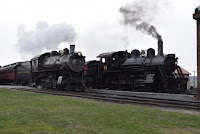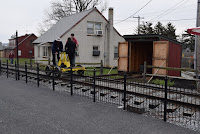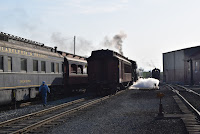The official host of the Heritage Rail Alliance convention was the Strasburg Railroad. While the museum across the street saw a lot of foot traffic, and was where the seminars were held, it appeared that the Strasburg Railroad (SRC) had done the lion's share of hosting duties for the convention. And a very impressive job they did!
I'd never ridden on the Strasburg and had barely made it across the street from the museum before. As tourist railroads go, the Strasburg is beautiful. The grounds - mostly a lengthy station platform and cluster of buildings - are impeccably manicured and the appearance is unfailingly attractive. Above, the interlocking tower looks down over a remarkably neat wooden doodlebug and one of the wooden coaches stored in the small yard across from the station.
For the entire weekend, SRC had three engines in steam - and that's just the standard gauge ones. When I first wandered over from the museum on Thursday morning, SRC 90 was simmering quietly across from the platform. This is the "other" operating Decapod on the continent. It was built by Baldwin in 1924 and ran its entire life for the Great Western Railway of Colorado. It was acquired from them by the Strasburg in 1967 and has been in pretty consistent use since then.
And look, here comes the third engine. Strasburg 475 - or I suppose I should say Norfolk & Western 475, as that's how it's lettered - is an M-class 4-8-0 Mastodon built in 1906 by Baldwin. I believe it's the only engine of that wheel arrangement in operation in North America. It ran until around 1960, when it was sold to a scrapyard. But it was rescued in 1963 and knocked around for a number of years - according to Wikipedia (always reliable) it even stopped briefly at IRM! SRC purchased the engine in 1991 from the Boone & Scenic Valley and had it in service in 1993. It's lettered for its original owner, as are a few of the Strasburg's coaches. Most equipment is lettered for SRC though the engines are lettered in the style of their original owners, which I think is a very nice touch.
The 475 was pulling the regular service train back from a revenue trip. The routine was to pull the train in on the siding at the platform, uncouple, pull ahead past the switch, back down the main alongside the train, and then pull forward again to couple onto the other end of the train - all ready to pull backwards on the outbound trip. Like IRM, the Strasburg doesn't turn its steam engines, but unlike IRM they run around the consist at each end of the trip. Anyway, I grabbed the above image as the 475 backed past the patiently waiting Decapod.
After that there was more fun to be had during the course of the day Thursday, including a lunch trip aboard a diner (wooden, of course, modified from a B&M coach). Along with the mainline trains - a regular hourly trip out to the end of the line at Leaman Place with 475 and the coach train, plus a couple of two-car train trips behind the 89 - there was also the "amusement park train" shown above. The engine is a live steam locomotive built by Cagney.
Well, if it isn't a couple of Bucks! Sure enough, IRM was well represented at the conference by Dan and Chris Buck, who are much more diligent about maintaining our presence at these things than I would ever be. As can be seen, SRC really is right across the street from the railroad museum. I don't think the Cagney was exceeding the speed limit.
And the Strasburg also offers handcar rides to guests, up and down the shop lead as shown. It's an interesting setup which was described to me by the SRC employee who was supervising (he happened to be a big AEM7 fan and was very happy we'd gotten one!). The handcar shown was built by SRC in its shop; it's generally similar to an original they have on display but they added a motorcycle drum brake to one axle. The SRC supervisor rides alongside the mechanism and runs the brake, which can stop the car much more effectively than the old wood block brakes. The rules are pretty strict: both hands on the pump handle, no selfies or photo taking, no locking your arms of course, and nobody short can pump. Kids are allowed to ride alongside the mechanism, across from the SRC supervisor, but must keep both hands on a grab iron placed there.
SRC has a lot of neat equipment sitting around. Besides a fascinating array of wooden passenger cars from various railroads, including the B&M, Ma & Pa, WM, and Reading, among others, there were also some pretty historic freight cars. My personal favorite was an XL class boxcar from around the turn of the century but another one that was hard to pass up on was this bobber, which I believe is basically identical to the one in IRM's collection. As with practically everything else at the Strasburg that doesn't make smoke, the freight cars are almost uniformly made of wood.
As with everyone else, SRC has a dead line. They've been very innovative in the practice of "cocooning" passenger cars to preserve them from the elements until time can be found to restore them. I'm not sure where this passenger car came from but it's being held for possible future rebuilding. Behind it is Reading 1187, an 0-4-0 "camelback" built by Baldwin in 1903. It's one of five camelbacks preserved in the country and is the only one in Pennsylvania.
So anyway, Thursday afternoon a group of us including David, Bruce Wells from Arden, Chris and Dan, and myself went along on a mixed train trip. SRC handles a decent amount of freight, maybe 5-10 car loads a week from the sounds of it, and they had a load to take to the NS interchange as well as eight loaded cars to pick up. So the Decapod brought us in a wooden combine, and the one loaded car, to the interchange where it was found that NS had neglected to drop off the eight incoming cars. Oops. It was still a fun trip but I didn't take any pictures. And the next day David and I spent in Philadephia (stay tuned). But never fear...
...because NS didn't drop off the cars Friday either! The eight incoming cars arrived overnight Friday night so Saturday morning the Decapod was again steamed up for an 8:30am trip out to the interchange to pick them up. We arrived at the yard as they were watering the 475, which would again be used on the day's service trains. The atmosphere was pretty neat.
Here's the two big engines after the 475 backed out of the way of the 90. What a thrilling sight on a beautiful morning!
And here comes the 90 with our wooden combine, approaching the road crossing where we'll be boarding. David pointed out that the Strasburg isn't entirely different than the Macomb Industry & Littleton, a short line in western Illinois that I researched when I was in college. That railroad, which was scrapped in 1930, never owned a caboose and always ran freight trains with a combine on the end. This trip was really a trip back in time, not just with the wood car and the steam engine but also with the six-horse teams plowing the fields along the route!
Our combine was dropped on the siding at Leaman Place and the Decapod proceeded up to the eight incoming cars and pulled them past us. It was really a show.
And here we are heading back to Strasburg, with the Decapod on the head end working against the grade. They told us that its limit is ten loaded freight cars so this was a decent workout. After we returned from this trip it was time for a couple of seminars, which were pretty interesting. And then there was the tour of the SRC shop
Unfortunately I didn't catch the name of our tour guide, but boy, he sure knew his stuff. And he was wearing a polka-dot Kromer too, so what's not to like! Here he explains the workings of the Niles wheel lathe that SRC has - and periodically uses, on drivers of up to 90" diameter. It was purchased just before the shop building went up and sits in its own well in the floor; the shop was constructed around it.
This is a small narrow gauge 0-4-0T which is being restored for the Railroad Museum of Long Island, if I recall correctly. Apparently it will be hauled to events on a truck trailer and fired up but won't be going very far or very fast, if it travels at all. SRC has been doing boiler work on it I think.
Here's an overview of part of the SRC shop. In the foreground is a narrow gauge 4-6-0 owned by the Colorado Railroad Museum. I believe it was originally built for the Florence & Cripple Creek. It's undergoing a long-term heavy overhaul. Beyond it, the shiny wheels you see are the driver centers for the 4-8-8-4 "Big Boy" currently being restored by the Union Pacific. All 12 of its wheel sets are at the Strasburg for bearing and other work. I guess this means I've seen about 3.08 "Big Boys" in my life?
Here we see some all-new metal steps that were built by the Strasburg for a wooden coach they're rebuilding. If you recall those cocooned cars on the dead line, they're being kept for a reason: within the last year SRC pulled one of the cocooned cars into the shop and has been completely rebuilding it, including an all-new interior, all-new sheathing, and a lot of new framing.
And here's the car. It's an ex-B&O coach but it's being restored as a parlor car. It will really be a beauty when it's done.
And that was mostly it for the Strasburg Railroad. My first visit was extremely impressive and I'd highly recommend it, especially to fans of steam engines and wood cars.




















Frank,
ReplyDeleteIt is not for nothing that this is one of the most successful tourist railroads ever operated. It is also right next to a high population area, but one with the charm of the Amish population.
As you pointed out, the Railroad Museum of Pennsylvania is across the street and about as good as tax payer money can make it! Throw in the museum of the National Model Makers Association and it just gets better still!
Ted Miles, past RMP member
Strasburg is part of a "complex" of 4 heritage rail sites: Strasburg, RR Museum of Pennsylvania, TCA Museum, and the Choo-Choo Barn.
ReplyDeleteKevin Brown